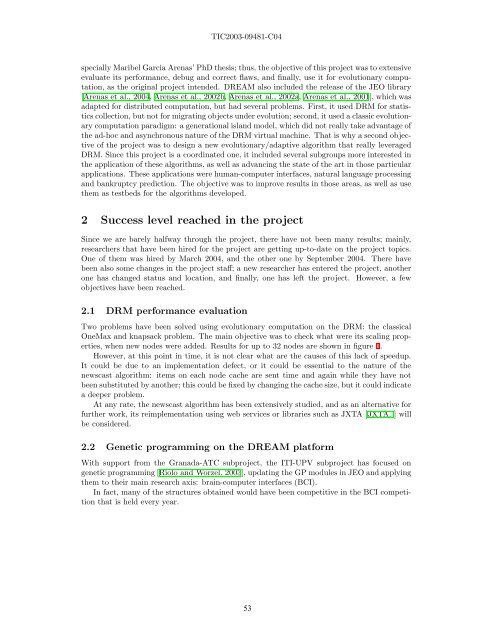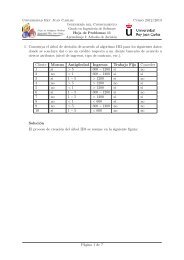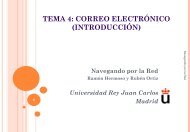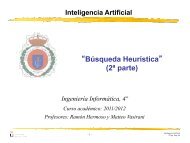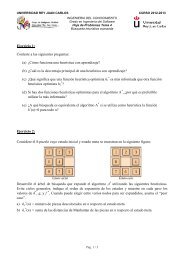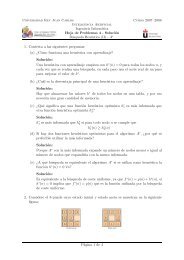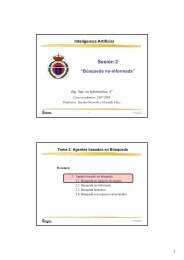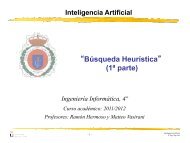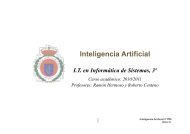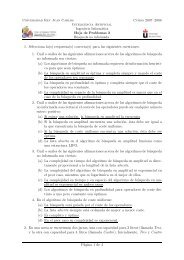GLIRS-II - Grupo de Inteligencia Artificial - Universidad Rey Juan ...
GLIRS-II - Grupo de Inteligencia Artificial - Universidad Rey Juan ...
GLIRS-II - Grupo de Inteligencia Artificial - Universidad Rey Juan ...
You also want an ePaper? Increase the reach of your titles
YUMPU automatically turns print PDFs into web optimized ePapers that Google loves.
TIC2003-09481-C04<br />
specially Maribel Garcia Arenas’ PhD thesis; thus, the objective of this project was to extensive<br />
evaluate its performance, <strong>de</strong>bug and correct flaws, and finally, use it for evolutionary computation,<br />
as the original project inten<strong>de</strong>d. DREAM also inclu<strong>de</strong>d the release of the JEO library<br />
[Arenas et al., 2004, Arenas et al., 2002b, Arenas et al., 2002a, Arenas et al., 2001], which was<br />
adapted for distributed computation, but had several problems. First, it used DRM for statistics<br />
collection, but not for migrating objects un<strong>de</strong>r evolution; second, it used a classic evolutionary<br />
computation paradigm: a generational island mo<strong>de</strong>l, which did not really take advantage of<br />
the ad-hoc and asynchronous nature of the DRM virtual machine. That is why a second objective<br />
of the project was to <strong>de</strong>sign a new evolutionary/adaptive algorithm that really leveraged<br />
DRM. Since this project is a coordinated one, it inclu<strong>de</strong>d several subgroups more interested in<br />
the application of these algorithms, as well as advancing the state of the art in those particular<br />
applications. These applications were human-computer interfaces, natural language processing<br />
and bankruptcy prediction. The objective was to improve results in those areas, as well as use<br />
them as testbeds for the algorithms <strong>de</strong>veloped.<br />
2 Success level reached in the project<br />
Since we are barely halfway through the project, there have not been many results; mainly,<br />
researchers that have been hired for the project are getting up-to-date on the project topics.<br />
One of them was hired by March 2004, and the other one by September 2004. There have<br />
been also some changes in the project staff; a new researcher has entered the project, another<br />
one has changed status and location, and finally, one has left the project. However, a few<br />
objectives have been reached.<br />
2.1 DRM performance evaluation<br />
Two problems have been solved using evolutionary computation on the DRM: the classical<br />
OneMax and knapsack problem. The main objective was to check what were its scaling properties,<br />
when new no<strong>de</strong>s were ad<strong>de</strong>d. Results for up to 32 no<strong>de</strong>s are shown in figure 1.<br />
However, at this point in time, it is not clear what are the causes of this lack of speedup.<br />
It could be due to an implementation <strong>de</strong>fect, or it could be essential to the nature of the<br />
newscast algorithm: items on each no<strong>de</strong> cache are sent time and again while they have not<br />
been substituted by another; this could be fixed by changing the cache size, but it could indicate<br />
a <strong>de</strong>eper problem.<br />
At any rate, the newscast algorithm has been extensively studied, and as an alternative for<br />
further work, its reimplementation using web services or libraries such as JXTA [JXTA, ] will<br />
be consi<strong>de</strong>red.<br />
2.2 Genetic programming on the DREAM platform<br />
With support from the Granada-ATC subproject, the ITI-UPV subproject has focused on<br />
genetic programming [Riolo and Worzel, 2003], updating the GP modules in JEO and applying<br />
them to their main research axis: brain-computer interfaces (BCI).<br />
In fact, many of the structures obtained would have been competitive in the BCI competition<br />
that is held every year.<br />
53


